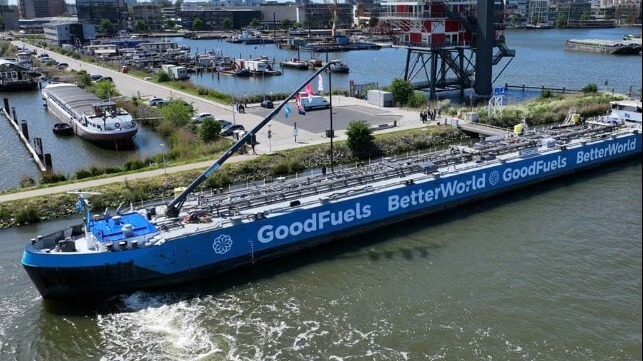Isotopic Tracer Test in Biofuel Demonstrates Accountability for Fuel

As interest grows globally in the maritime industry for the use of biofuels, GoodFuels one of the pioneers in the field reports it has successfully tested the use of isotopic tracers to improve accountability within the marine fuels sector. According to the company, it is the first step toward increasing transparency in the fuel supply chain and providing greater assurance to the customer with a verification tool.
GoodFuels is working in partnership with the global certification organization Control Union and France’s IDS Group to test the effectiveness of a unique isotopic tracer for biofuels. The companies are collaborating through the partnership, which commenced in early 2022, to create the new tracer, which can be added to marine fuels as a unique ‘fingerprint’ and verification tool.
According to the companies, the tracer can be applied at any stage in the supply chain and is based on natural elements so as not to compromise the sustainability of the biofuel product. It has been specifically designed to trace fuels at different granularity levels, making it suitable to be used within fuel products whether they are 100 percent biofuel or part of a blend with conventional marine fuels.
The isotopic tracer stays within the fuel throughout the entire downstream of fuel delivery. It then can be tracked and traced by inspectors to verify that a fuel product has not been diluted or tampered with at any stage in the supply chain. The trial has demonstrated that the tracer does not adversely impact the physical properties, quality, and stability of the biofuel and that tracing and testing activities could be performed without any impact on bunker operations.
A successful pilot was recently conducted during a delivery of 500 tons of biofuel to the Norden-owned tanker Nord Gardenia. The pilot proved the effectiveness of the tracer technology in real-life applications and also showed that the isotopic tracer can successfully measure for fuel dilution, for example when biofuels are used in a blend.
It can also be used to support carbon calculations and provide evidence for carbon pricing and tax reductions, giving shipowners and operators assurance on the amount and quality of biofuel they are deploying in their pursuit of sustainable shipping. Johan Maris, CEO of the Royal Peterson and Control Union Group points out that the tracer technology has broad applications for example to ensure that the fuel doesn’t originate from banned countries.

that matters most
Get the latest maritime news delivered to your inbox daily.
“We are pleased to demonstrate and prove our ability to physically mark, track and trace (bio)fuel products, setting the new bar for traceability alongside the frontrunners in sustainability,” said Patrice Fauvet, CEO and R&D Director of IDS Group. “We are also exploring expanding our patented marking technologies to any other hydrocarbon product.”
The companies reported that the tracer project is just the start of a wider partnership between GoodFuels, Control Union, and IDS Group. All three companies share an ambition to increase transparency in the fuel supply chain, and the tracer will help they believe to advance a shared vision of a standard label for biofuels that would be recognized worldwide as a sign of quality by the fuel market.
